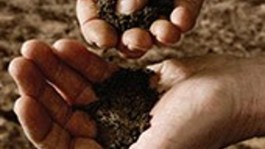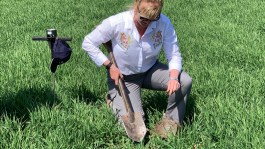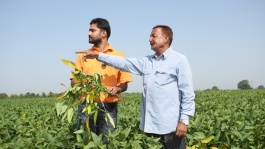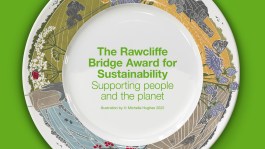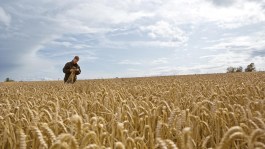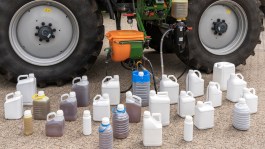Project Fortress
Project Fortress is a five-year project at The Grange Farm in Northamptonshire. Located in “Fortress Field”, our aim is to see how we can improve the soils and carbon storage of this field over a five-year period. To do this, we are assessing different rotations, cultivations and inputs to look at what has the biggest impact. Visit this page to stay up to date with Project Fortress and find out what we’ve learnt.

The field
‘Fortress Field’ covers 12.5 ha of Hanslope clay arable farmland and is located at The Grange Farm in Northamptonshire. The field slopes from west to east, and is under-drained and uniform in composition, allowing real treatment effects to be seen. The wheat drilled in 2020 and harvested in 2021 provides the crop baseline data. In 2021, BASF, in collaboration with host farmer William Pitts, mapped out seven innovative plot areas, where the interventions aim to improve the soil health, increase carbon storage, provide pollinator and IPM beneficial habitats, and produce core data on profitability and climate resilience.

Supercharger Cover Crops
The benefits of cover cropping for modifying soil health, reducing soil erosion, alleviating compaction, suppressing weeds, increasing moisture and retaining valuable nutrients are generally known, but its ability to protect yield potential in a changing climate is less understood. The supercharger cover crops sown in Project Fortress are helping us understand if their positive effects on soil health and carbon can increase exponentially the longer they are left in the ground. The seed mix supplied by Cotswold Seeds has both nitrogen fixing and deep rooting plants which can exploit the more open soil created by low disturbance subsoiling in autumn 2021. By taking areas out of the main crop rotation for either one or two years, we anticipate “supercharging the soil”, improving farm profitability (enhanced by using SFI to fund the cover crops) by increasing the yield of forthcoming wheat crops in 2023 and 2024.

Agrofloristry
Integrating flower strips has been researched recently through the ASSIST project. Project Fortress “Agrofloristry” takes this approach one step further and adds an undisturbed tussocky grass area between two meadow flower strips (8m wide in total) and is fully embedded across productive cropland. Through this process, beneficials delivering insect pest control are fully supported across the whole year, as part of an IPM approach.
What are we measuring?
With the support of independent experts, we’re monitoring how different rotations and management techniques are affecting soil health, biodiversity levels and insect populations whist ensuring the arable land remains profitable.
Independent Soil Health Expert Jenni Dungait is measuring the bulk density and soil organic carbon levels of fortress field’s soils. Bulk density is an indicator of soil compaction. When soils become too compact, water cannot flow easily through it making it more difficult from crop roots to grow and impacting on yields. Soil Organic Carbon plays a crucial role in soil function & eco-system services by feeding the soil biology and increasing flooding resistance. Across each of the plots, we have taken 5 samples to measure the amount of carbon in the soil and to get an average of the soil organic carbon score for each area, at three different depths.
Biodiversity
BASF has worked with independent wildlife specialist Marek Nowakowski for many years. Marek is monitoring the levels of beneficials throughout fortress field and its hedgerows to understand in interventions such as the turning headlands and the agroflorestry are having a positive impact on population levels.
Invertebrate sampling
Working in collaboration with the Game & Wildlife Conservation Trust, we’re monitoring invertebrate levels within the different habitat types of fortress field including on the ground and in the crop.

